 |
|
|
Past
Events

Listed here are some featured Pioneer events.
|
 |
|
|
 |
| ../ main
page / events / naming of a locomotive
2 |
|
Naming of a Locomotive - 14th November
1963 |
|
At St Pancras Station on 14 November the Corps joined with
British Railways to name one of the latest diesel engines
"The Royal Pioneer Corps."
|
|
|
Hundreds of passengers left waiting rooms and departure platforms
to watch this impressive ceremony on Platform 6. The Corps
of Drums and a detachment of recruits from the Depot, under
command of Lt J B Snowdon, gave the General salute on the
arrival of the official party. The detachment bore witness
to the smartness of the Pioneers in todays progressive Army.
Lt Gen Sir John Cowley, KBE CB AM performed the naming ceremony
at the invitation of Mr M C B Johns, Divisional Manager of
the London Midland Region of British Railways. The other official
guests were Maj Gen A Jolly CB CBE DSO, Vice Quartermaster
General, The War Office, Brig C R Nicholls MBE DPL The War
Office, Brig H G L Prynne CBE MC TD, Vice President and Chairman
of the RPC Assn Council, The Rev G P H Rowson, CF, Chaplain
of the RPC Depot, Mr T R Barron, Assistant Divisional Manager,
British Railways and Mr J G Handley, Station Master of St
Pancras, resplendent in traditional top hat and tails and
with a brilliant scarlet carnation in his buttonhole.
• The Colonel Commandant
inspects the detachment
at the naming ceremony
|
| After inspecting
the detachment and the Corps of Drums the Colonel Commandant
was introduced to the old comrades. The ceremony was the first
of its kind held in London for five years and the 2500 hp engine
D54 is the first of the London Midland Region's fleet of mainline
diesel locomotives to carry the name of a Corps of the British
Army. Weighing over 135 tons and with an overall length of nearly
68 feet, it can easily maintain speeds of up to 90 miles per
hour while pulling the heaviest of express passenger trains.
Mr Johns said "We are proud of it. The locomotives of this
series were the first big diesel-electrics to be designed and
built by British Railways and they were the largest and most
powerful erected in our own Railway Workshops". |
D54 was built at Crew and will operate between St Pancras
and Manchester, Leeds, Bradford, Sheffield, Nottingham and
Derby. It will also pull freight trains and will cover at
least 400 to 500 miles daily. Mr Johns spoke of it as a
Pioneer and said it will have ample opportunity to work.
It takes the place of the Patriot Class steam engine named
after the Corps by Field Marshall Viscount Montgomery in
1948 which was recently retired after covering well over
1,280,000 miles during its working life, and the name plates
are now preserved in the Corps
Museum.
• General Cowley talking with the Chelsea
Pensioners at the naming ceremony.
|
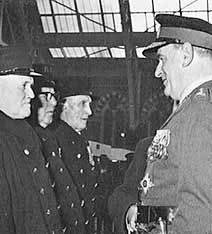 |
|
Mr Johns said that the mention of the word work "leads
one to think immediately of the prodigious tasks performed
by the Royal Pioneer Corps during World War II and to recall
Field Marshal Montgomery's remarks at the 1948 naming ceremony,
when he said that it was a very appropriate thing that British
Railways should name an engine after a Corps with which the
Railways had been so closely related during the War. He also
pointed out that none of the work of the Corps had carried
with it much glamour or limelight, but nevertheless it was
vital to the final victory."
Mr Johns added "These comments apply equally well to
the locomotive here today, for it has once again brought the
Corps and the Railways into close relationship and, while
it may have less glamour and appeal than a steam engine, it
will perform its work far more economically and therefore
play a vital part in winning the Railways' battle for solvency.
In reply Gen Cowley said it was significant that only fifteen
years ago the latest type of steam engine was named "The
Royal Pioneer Corps" and now it had been honourably retired.
He said "This is a measure of the effort needed to keep
a railway system up to date. A similar effort is required
to keep the Army up to date and the Royal Pioneer Corps of
today looks very different to the Corps in 1948. Then is consisted
largely of National Servicemen doing their two years of compulsory
service. Now it is a Corps of volunteers who have chosen soldiering
as their profession - a smaller Corps but more efficient and
better equipped. Like the new engine, in the words of Mr Johns,
it has the ability of working many more hours a day with less
attention, and the Army also is taking every advantage it
can of these important capabilities, and is operating this
Corps more intensively and for longer periods than its predecessor.
Declaring that he wished the engine many years of good service
and expressing confidence that when it was eventually honourably
retired it would have travelled about 1 and half million miles,
or 6 times the distance to the moon, the Colonel Commandant
then named the engine "The Royal Pioneer Corps"
and unveiled the name plates. The giant locomotive was blessed
by the Rev G P H Rowson, CF, Chaplain of the RPC Depot and
the Vicar of the Church of the Holy Sepulchre, Northampton.
Gen Cowley then mounted the foot plate and with the special
controller key started the engine for the first time under
the name "The Royal Pioneer Corps."
During the course of his address Mr Johns presented Gen Cowley
with a framed photograph of the giant diesel and after the
unveiling ceremony the Colonel Commandant was introduced to
the driver, Mr J A Graham and the Secondman, Mr J Ratcliffe
and presented them with suitably inscribed tankards, on behalf
of past and present members of the Corps, in commemoration
of the ceremony.
The guest were invited to lunch at the Kings Cross Hotel
during which the Colonel Commandant thanked Mr Johns and his
colleagues on behalf of the Corps and the Association for
permitting and arranging for the ceremony to take place. Two
hours after the ceremony the 90 miles per hour diesel-electric
engine "The Royal Pioneer Corps" was pulling the
3.25pm train out of St Pancras to Manchester. By chance one
of the passengers aboard was Dr Beeching, Chairman of British
Railways, whose hopes for the successful modernisation of
his vast and intricate charge included the introduction of
the hard working diesels like "The Royal Pioneer Corps."
|
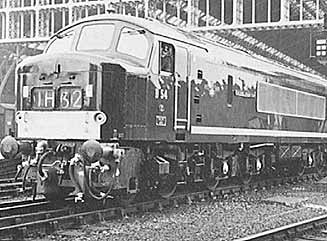 |
• The diesel
locomotive D54
leaves St Pancras under its new
name "The Royal Pioneer Corps" |
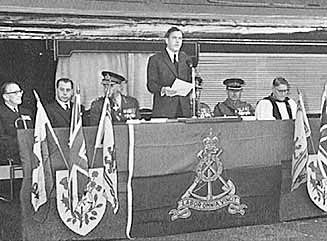 |
• Brig H
G L Prynne, Mr T R Barron,
Gen SirJohn Cowley,
Maj Gen A Jolly, Brig C R Nicholls
and the Rev G H P Rowson on the
day during the address by
Mr M C B Johns |
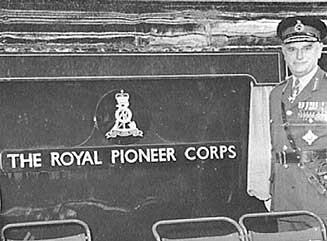 |
• The nameplates
are unveiled |
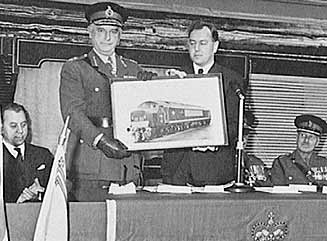 |
• Mr M C
B Johns presents the Colonel
Commandant with a framed photo of
"The Royal Pioneer Corps" |
|
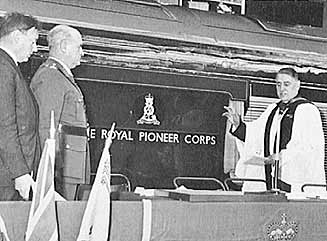
|
• The Rev
G H P Rowson blesses
the new locomotive |
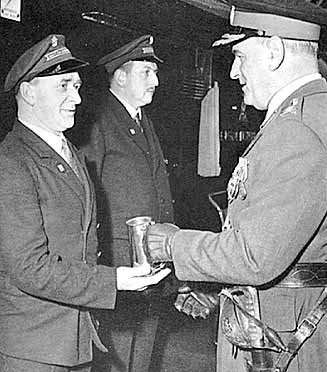 |
• The Colonel
Commandant presents
the Driver and Secondman with
inscribed tankards |
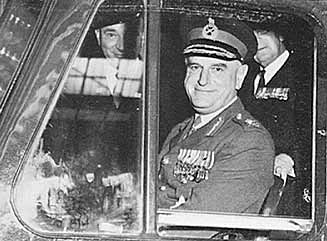 |
• The Colonel
Commandant in the
driving cab after the ceremony |
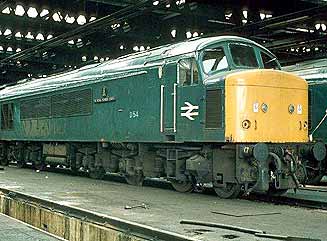 |
• "The
Royal Pioneer Corps" after
years of long service. |
|
|
|
|
